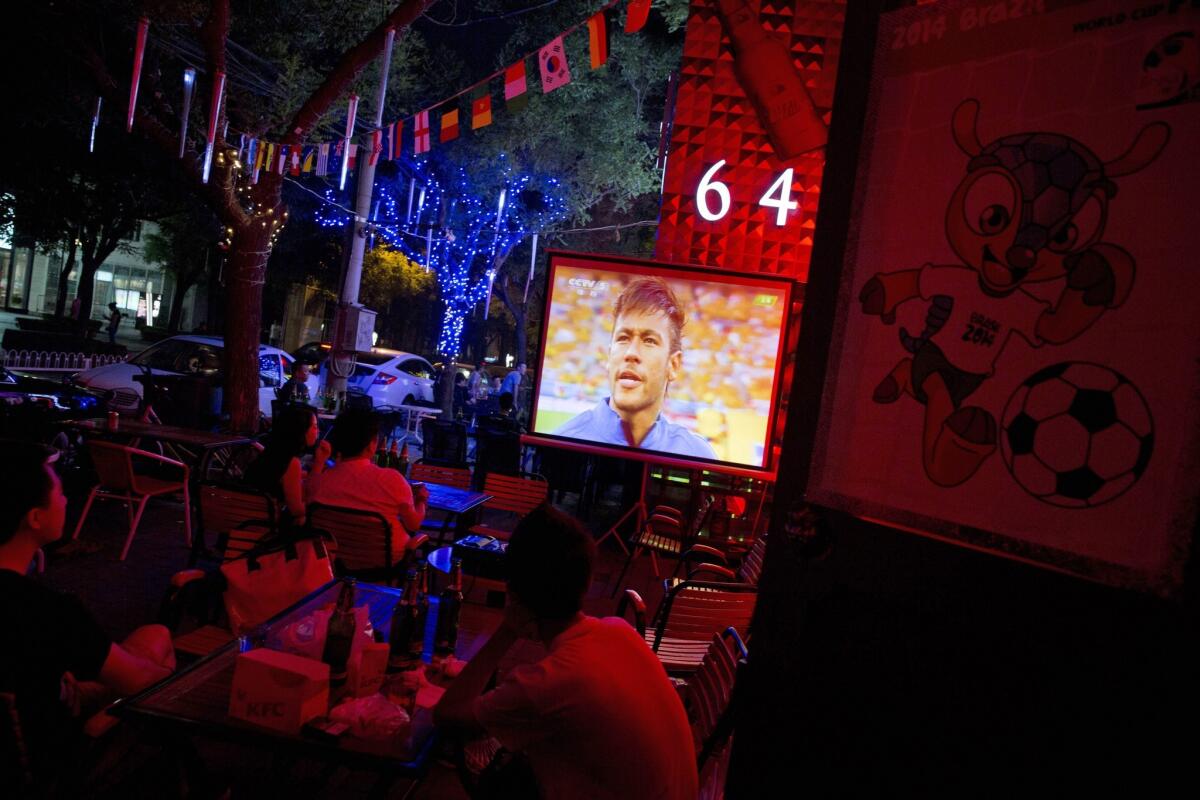China calls in sick, burns midnight oil to watch World Cup

The matches are broadcast in the dead of night, and China can’t even root for itself this year. But that hasn’t stopped Chinese soccer enthusiasts from going World Cup crazy.
Hard-core fans were preparing for the action by buying fake doctor’s notes online to get out of work Friday, local media reported. The extreme time difference between China and Brazil meant Chinese fans had to get up at 4 a.m. if they wanted to watch Brazil go head to head with Croatia. The next set of matches begins at midnight Friday local time, with Mexico taking on Cameroon. Real night owls can stay up for Spain versus Netherlands (3 a.m.) and Chile versus Australia (6 a.m.).
Many Chinese employers require notes from physicians to excuse sick employees from work, and generic doctor’s notes have long been available on e-commerce sites such as Taobao. Getting one that looks legitimate -- with a hospital stamp -- can cost about $50. (By Friday, the search terms for such notes were blocked on the site.)
One IT company in the southern city of Shenzhen, Yingchi Technology, instituted a work-from home policy during the World Cup, prompting a local publication to declare the CEO the city’s “best boss.”
China qualified for the World Cup for the first time in 2002; however, the team failed to score even one goal despite being coached by Bora “The Miracle Worker” Milutinovic. Since then, the national squad has not been able to land a berth.
Nevertheless, the legions of Chinese soccer fans seem to be growing. Shenzhen University set up an outdoor viewing session early Friday in an outdoor amphitheater, drawing an audience of 2,000. Some college students, however, are lamenting the timing of the World Cup (and the NBA Finals, also popular here), because the contests fall just as final exams are getting underway.
One student went so far as to joke on Weibo, China’s Twitter-like microblog service, that the “World Cup and NBA finals are another big plot by European and U.S. imperialists to destroy Chinese college students” by distracting them during test season.
Some bars were staying open 24 hours to cater to fans. This week, police were sending out special warnings in many cities reminding people not to drive while tired or drunk after staying up late to watch soccer. During the 2010 World Cup in South Africa, Chinese police said they logged 33,580 DUIs and 225 drunk-driving accidents, which killed 91 people and injured 247.
Beijing’s subway system operator had planned to temporarily rename stations on one of the city’s lines with different soccer team names to “create an atmosphere for the World Cup.” Last week, placards went up at various stations along the 35-stop Line 4, with Xidan station getting a sign for Spain and the country’s flag. Renmin University was rebranded as Brazil.
However, the plan was scrapped amid complaints it might confuse passengers.
Another World Cup publicity stunt involving pandas was also canceled at the last minute. State-run media had said that a team of baby pandas at a research center in Sichuan province would predict the winners -- a la Paul the Octopus, the German sea creature that made headlines in 2010 with his picks.
Exactly how the pandas’ picks would be made was unclear -- some suggested it would involve assigning different flags to bowls of food and seeing which dish the cubs chose to eat from; another plan called for putting flags of different countries on trees and watching to see which ones the pandas climbed.
But the plans were dropped amid concern that the pandas were being exploited for entertainment, state-run Xinhua News Agency reported.
Tommy Yang in the Times’ Beijing bureau contributed to this report.
More to Read
Start your day right
Sign up for Essential California for news, features and recommendations from the L.A. Times and beyond in your inbox six days a week.
You may occasionally receive promotional content from the Los Angeles Times.







